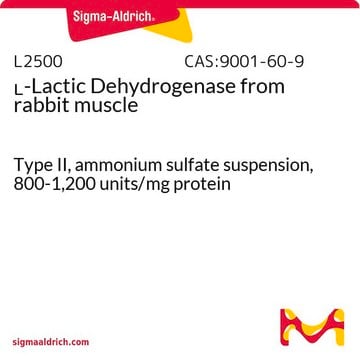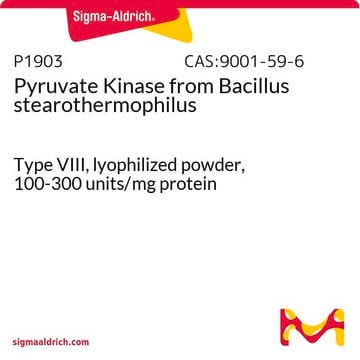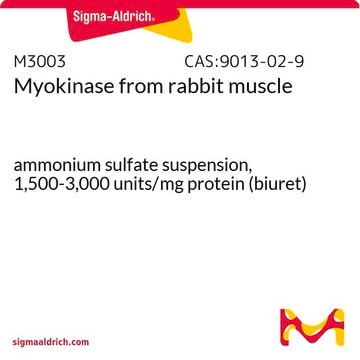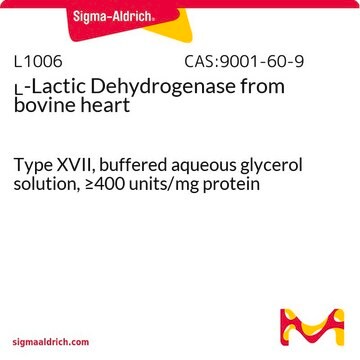10109045001
Roche
Pyruvate Kinase (PK)
from rabbit muscle
Sinónimos:
PK
Iniciar sesiónpara Ver la Fijación de precios por contrato y de la organización
About This Item
Productos recomendados
biological source
rabbit muscle
Quality Level
form
solution
specific activity
~200 units/mg protein (At 25 °C with PEP as the substrate.)
packaging
pkg of 1 mL (10 mg)
manufacturer/tradename
Roche
optimum pH
7.0-7.5
shipped in
dry ice
storage temp.
−20°C (−15°C to −25°C)
Categorías relacionadas
General description
Pyruvate kinase has a molar mass of 237,000 and exists as a tetramer. Each polypeptide chain of this tetramer has a molar mass of 57,200. The enzyme contains two identical catalytic particles called protomers. Each of these protomers contains two polypeptide chains. Each protomer contains one site each for Mn2+ and phosphoenolpyruvate.
Specificity
Specific activity: Approximately 200 U/mg at +25°C with PEP as the substrate.
Application
Pyruvate Kinase (PK) has been used as a sample in ATPase Assays.
Pyruvate Kinase (PK) has been used in the kinase assay.
Biochem/physiol Actions
Pyruvate kinase catalyzes the irreversible conversion of P-enolpyruvate and ADP to pyruvate and ATP with the utilization of a proton. The first step is the transfer of phosphate group from P-enolpyruvate to ADP with the formation of bound enolate of pyruvate and ATP. In the second step, a proton is added to enolate to generate the keto form of pyruvate. The enzyme also exhibits other activities, such as ATP- and bicarbonate-dependent ATPase, phosphorylation of fluoride and hydroxylamine, ATP-dependent phosphorylation of glycolate, and decarboxylation of oxaloacetate.
Quality
Contaminants: <0.001% GK, <0.002% HK, “NADH oxidase”, and ATPase, each, <0.01% enolase, LDH, and myokinase, each.
Physical form
Solution in 50% glycerol (v/v), pH approximately 6
Preparation Note
Activator: PK requires Mg2+ (or Mn2+, Co2+) and K+ (or NH4+, Rb+) for full activity.
Other Notes
For life science research only. Not for use in diagnostic procedures.
Storage Class
12 - Non Combustible Liquids
wgk_germany
WGK 1
flash_point_f
No data available
flash_point_c
No data available
Certificados de análisis (COA)
Busque Certificados de análisis (COA) introduciendo el número de lote del producto. Los números de lote se encuentran en la etiqueta del producto después de las palabras «Lot» o «Batch»
¿Ya tiene este producto?
Encuentre la documentación para los productos que ha comprado recientemente en la Biblioteca de documentos.
Los clientes también vieron
Ryo R Watanabe et al.
iScience, 26(5), 106626-106626 (2023-05-17)
F1-ATPase (F1) is an ATP-driven rotary motor protein ubiquitously found in many species as the catalytic portion of FoF1-ATP synthase. Despite the highly conserved amino acid sequence of the catalytic core subunits: α and β, F1 shows diversity in the
In vivo evidence for ATPase-dependent DNA translocation by the Bacillus subtilis SMC condensin complex
Wang X, et al.
Molecular Cell, 71(5), 841-847 (2018)
Matthias M Schneider et al.
Nature communications, 12(1), 5999-5999 (2021-10-16)
Molecular chaperones contribute to the maintenance of cellular protein homoeostasis through assisting de novo protein folding and preventing amyloid formation. Chaperones of the Hsp70 family can further disaggregate otherwise irreversible aggregate species such as α-synuclein fibrils, which accumulate in Parkinson's
Metabolic control and structure of glycolytic enzymes. 3. Dissociation and subunit structure of rabbit muscle pyruvate kinase.
M A Steinmetz et al.
Biochemistry, 5(4), 1399-1405 (1966-04-01)
T M Larsen et al.
Biochemistry, 33(20), 6301-6309 (1994-05-24)
The molecular structure of rabbit muscle pyruvate kinase, crystallized as a complex with Mn2+, K+, and pyruvate, has been solved to 2.9-A resolution. Crystals employed in the investigation belonged to the space group P1 and had unit cell dimensions a
Nuestro equipo de científicos tiene experiencia en todas las áreas de investigación: Ciencias de la vida, Ciencia de los materiales, Síntesis química, Cromatografía, Analítica y muchas otras.
Póngase en contacto con el Servicio técnico











